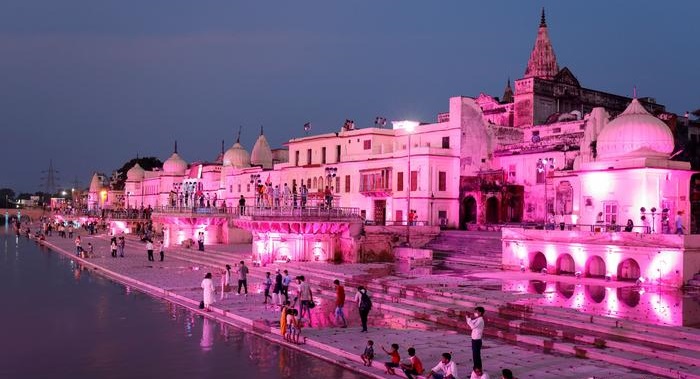
NEW DELHI: Indian Prime Minister Narendra Modi on Wednesday laid the foundation stone of a grand temple dedicated to Lord Ram in Ayodhya, a town in northern state of Uttar Pradesh.
Ayodhya is considered as the birth place of Lord Ram. It is believed that Lord Ram was born here thousands of years ago.
The PM's presence at the foundation stone laying ceremony attracted severe criticism from a section of Indian society. According to Asaduddin Owaisi, a Muslim lawmaker from southern state of Telangana, Modi should not have taken part in this ceremony in the capacity of PM as India is a secular country.
A section of media also criticized Modi for participating in the ceremony. Deccan Herald, an English daily widely read in southern India, carried an article on Wednesday titled -- "Inappropriate for a PM to be associated with the stone laying ceremony."
The temple will have five domes with intricate carvings. It will be a three-floor structure with a height of 161 feet. It will be constructed at a site, an area of around 2.77 acres, that was bitterly contested between the people belonging to Muslim and Hindu communities for hundreds of years.
Till December 1992, there existed a mosque -- Babri Masjid at the same spot, which the Hindus believe was constructed by emperor Babar after razing a Ram temple which originally existed there.
Babar, originally hailing from central Asia, invaded India over 500 years ago. As per the historical records, he captured Delhi and founded the Mughal Empire, considered as the greatest dynasty of north-India.
On Dec. 6, 1992, a large number of Hindus razed the Babri Masjid amid large scale violence which claimed over 2,000 lives. Since then the deity of Lord Ram was placed in a makeshift tent at a nearby place, even as the Hindus and the Muslims fought in courts of law.
The "Ayodhya Land Dispute Case" between the Hindus and the Muslims is one of the longest pending cases in the country.
Finally, in a landmark judgment in November last year, the apex court -- Supreme Court of India allowed the construction of Ram Temple at the disputed site, saying the Muslims will be given an alternate five-acre land for building a mosque.
The court ruling also stated that the demolition of the 16th century Babri Masjid was "a violation of law."